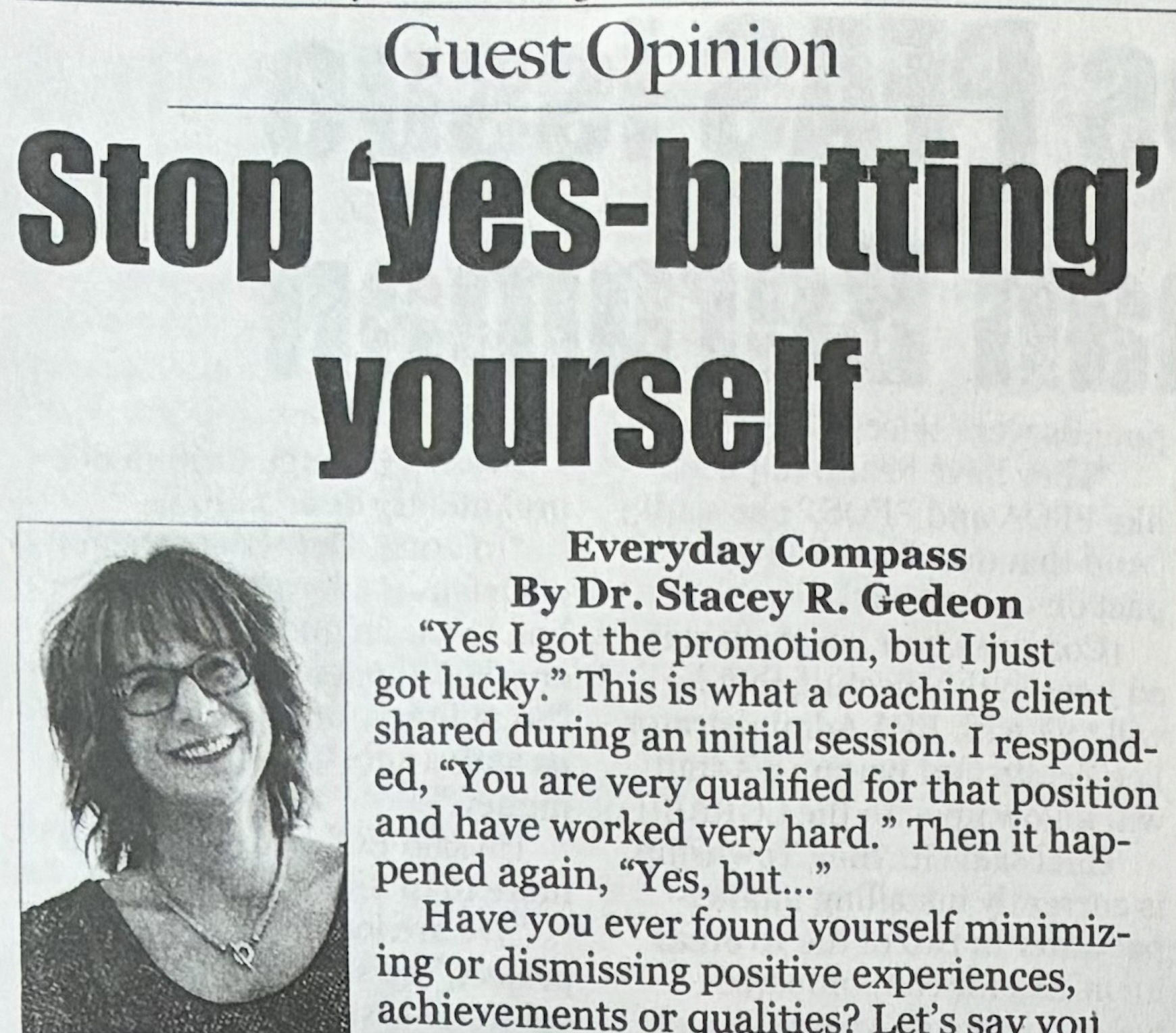Houghton Lake Resorter | Stop “Yes-Butting” Yourself
“Yes I got the promotion, but I just got lucky.” This is what a coaching client shared during an initial session. I responded, “You are very qualified for that position and have worked very hard.” Then it happened again, “Yes, but…”
Have you ever found yourself minimizing or dismissing positive experiences, achievements or qualities? Let’s say you are working on increasing healthy behaviors and someone comments on your dedication or progress. Do you tend to accept the compliment – “Thank you; I have been putting in a lot of effort!” Or do you reply with something like, “I am working at it, but I’m still not where I want to be.” Maybe you have a habit of undermining your accomplishments with your own self-talk (“I exercised, but I didn’t follow my eating plan every day.”). Notice the different thoughts and emotions that bubble up with each of the responses or self-talk. By acknowledging and accepting the compliment, we are likely to find the first response helpful with ongoing motivation. If instead we discount the progress we have made and focus on what remains, we are likely to be less satisfied about our gains, which could interfere with our ongoing efforts to improve our health.
Consider another example involving evaluations, either in work or school settings. Let’s say you received 100% in every category except one that was rated 90%. What is your mind drawn to – the majority of items where you excelled or the one item where you were less than perfect? Dr. Rick Hanson, a neuropsychologist and author, summarized this phenomenon well when he said, “The brain is like Velcro for negative experiences and Teflon for positive ones.”
This style of thinking is called discounting the positive and is one of many types of unhelpful thinking habits that all humans experience at one time or another. Having these sorts of negative thoughts on occasion may not significantly impact your well-being. If, however, you routinely discount the positives in your life it can not only decrease motivation, but can contribute to lack of confidence, low self-esteem, depression, and difficulty forming and maintaining healthy relationships. This thinking style invalidates success and joy before it can be internalized, which is an important process for ongoing motivation and well-being. When we struggle to give ourselves credit for our abilities and effort and attribute accomplishments to external factors, we are doing ourselves a great disservice.
Why would we do this to ourselves? It turns out that focusing on what we got “wrong,” may have been an evolutionary advantage for our ancestors. Our brains are wired for survival and hyper focusing on the negative, wrong, or absent things in day-to-day life was critical to avoid danger and promote existence. Like other behaviors we have inherited from our ancestors, present-day life rarely requires this level of vigilance, but here we are navigating being human.
What steps can we take to “but our buts?” As with most automatic thoughts, the first step is to notice it is happening. It might be helpful to think about past events that fall into the category of discounting the positive. Ask yourself, “What’s a positive thing I did recently and then said/thought yes, but…” to? How about a situation when you focused on the one thing you did wrong instead of the many you did right? Learn to catch yourself when you minimize your positive efforts and achievements. Then name it – “There’s my brain discounting the positive again” or take it a step further with, “I notice my brain is discounting the positive again.” The professional jargon for this step is cognitive defusion and it allows you to experience difficult thoughts and feelings without getting overwhelmed or controlled by them. After naming comes reframing by changing your “yes, but…” to “yes, and…” For example, my coaching client’s reframe included, “Yes I got the promotion, and it was something I earned through hard work and commitment.” Now they are able to give themselves credit, own their success, and have agency over their well-being. Finally, I highly recommend people keep a success log, achievement journal, or something similar to capture achievements. It is helpful to review this collection from time to time. Remember, we are wired to focus on what went wrong, so we must be intentional about acknowledging all of the things we do well.
If you would like to gain more insight and strategies, please reach out for additional guidance. More information on this and other topics can be found on YouTube at UndercomplicatingStuff.
Dr. Stacey R. Gedeon of Roscommon County is a clinical health psychologist and founder of SRG Healthcare Consulting and Professional Coaching, PLLC (srghcc.com). The content of this column is for informational purposes only and does not constitute professional advice or services in her capacity as a licensed psychologist. If you have suggestions for future topics on managing everyday challenges, please submit them to drgedeon@srghcc.com.

